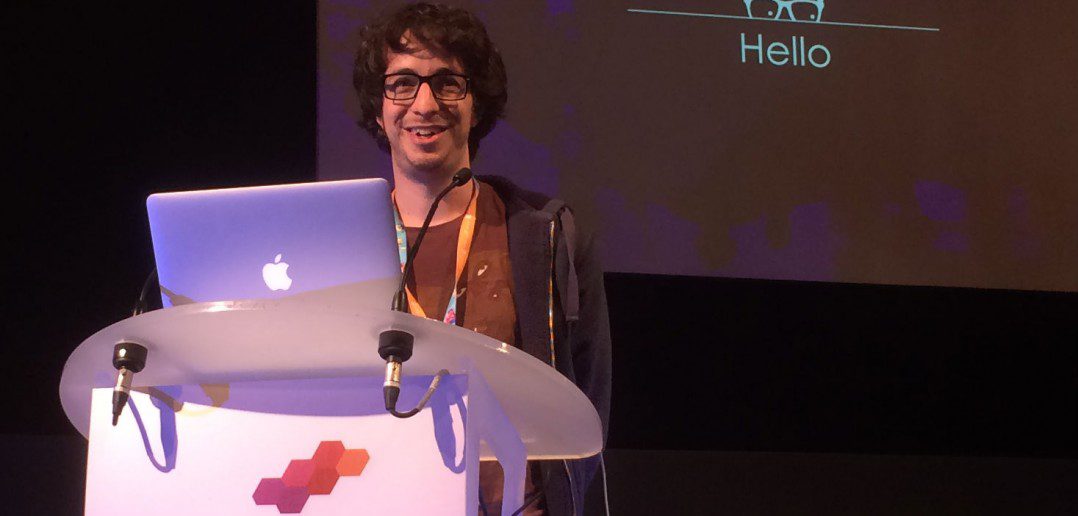When Yoni Bloch was five years old, his mother signed him up for classical music lessons, while his dad bought him a Commodore 64. “I loved to programme and play games, and I also liked to play music. As you can imagine, I didn’t have a girlfriend until pretty late on! » he told the Future of Kids TV Summit at MIPTV.
Eventually, Bloch got a record deal, released three albums and even became a judge on the Israeli version of X Factor. Then he started Interlude, a company to make interactive music videos. The child making games and learning to play music became a man combining the two disciplines to imaginative and innovative effect.
“We had the very basic idea that instead of taking a linear timeline, we would let creators build a whole world, and then let users play with it,” he said, showing his first interactive video, where fans can choose different paths through the video by clicking on characters that they see.
“There’s actually 256 different combinations you can make of the video,” he said. “It’s made out of 21 scenes, and if you don’t make a choice, it will make a choice for you.” Those choices including switching from electric to acoustic – “We also change the music, not just the video,” he explained. “You can choose who from the band will play the solo!”
“Because you make all the choices in real-time, you are actually making your own version of the video,” said Bloch. “Kids and teenagers mostly spread it and shared it on Facebook and said ‘did you hear the new Yoni Bloch song?’, and then someone else would say ‘Yes, but you didn’t hear it in the way I heard it’… It was great to see how they suddenly felt they were part of the creation.”
Interlude started talking to scriptwriters and directors about its tool, turning it into mapping software to build these kinds of nonlinear stories. It’s since been used for bands like We The Kings, who made a video where every choice is a different mini-game. Bloch showed one, playing as the band’s bass player. “If I lost, the bass player dies, and there’s no more bass in the song!” he grinned.
The authoring tool can publish to Android, iOS or web, and soon Xbox too. Interlude has also been used by Porsche for a video ad where people can change the colour and wheels of a car as it zooms through a landscape. It was also used for A Personalised Conversation with President Shimon Peres, to celebrate his 90th birthday.
“He presents himself, but then you can click what you want to talk to him about… and depending on what you talked about, comes new subjects,” explained Bloch. The average time spent with the video was almost 40 minutes. “We don’t think anybody would have stayed so long on a regular linear thing.”
What about kids, though? Interlude has been used by one American company to create interactive, animated music instruments, where kids can choose a flute, a trumpet or a french horn to join in, altering the music. Meanwhile, Interlude has built a powerful analytics tool behind its software, to help partners track what people are doing with the interactive content.
“We are trying to say there are maybe new kinds of storytelling,” he said, before showing a final demonstration of a song where the lyrics change in real-time, in response to choices made by the user – for example, a love song can be about their eyes, face or body, and even customised with their name. Yoni added that he made an interactive video to propose to his then-girlfriend. “If she says no, it goes into buffering and then it stops!” he said.
Where might this go next? “A lot of our focus is on that creative thing: allowing creators to create things they couldn’t before, and also filling in that gap between a game and am movie,” he said. “I don’t think TV is dead, but I do think that how video is used today on the web is really under-used, not taking advantage of the fact that it’s a nonlinear platform.”
Interlude is making money licensing its technology for advertisers, with Pepsi having recently used its platform. Meanwhile, Disney has used it for a video that got more views in its interactive version than on YouTube. Bloch hopes that more people from the TV and film production worlds will experiment with Interlude’s technology, especially if they’re making content for younger viewers.
“Everything is about repetition… teenagers especially have so much less attention span,” he said, harking back to his reasons for making interactive videos for his music in the first place. “I was thinking how can I invest a bit more to get them to repeat my piece of content instead of going to the next thing quickly.”
He also said that Interlude is increasingly interested in how interactive videos might work on the next generation of connected TVs, including through devices like Xbox consoles with their Kinect motion-control devices.
Be sure to read our exclusive Eurodata TV Worldwide whitepaper “International Kids TV Trends”! Download here (email required)




